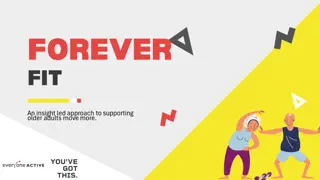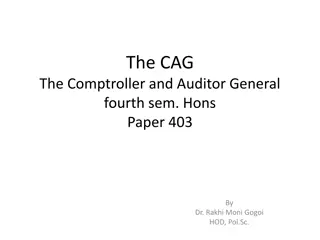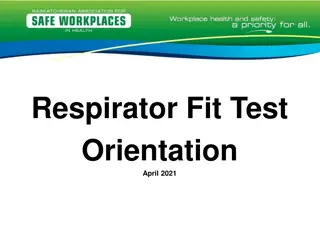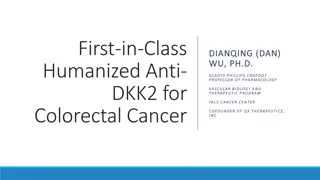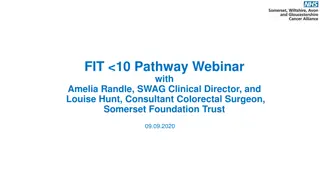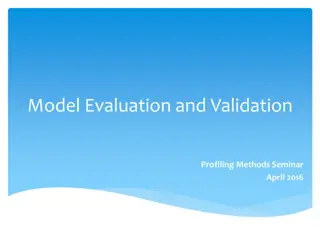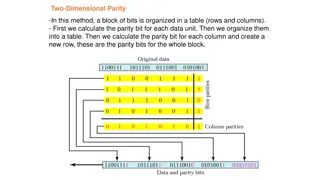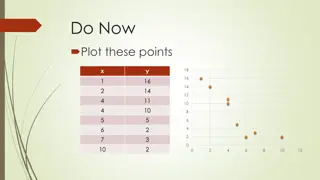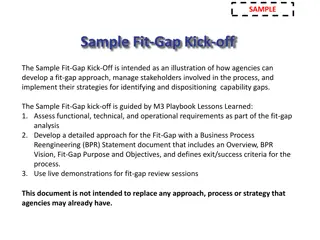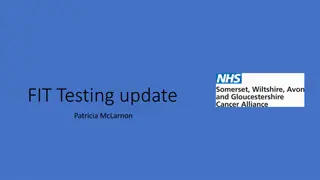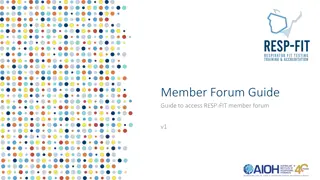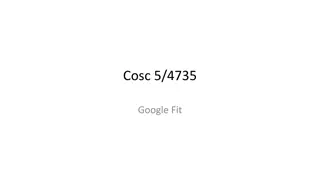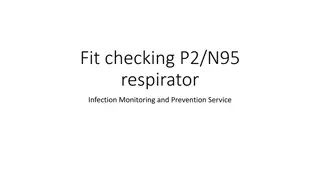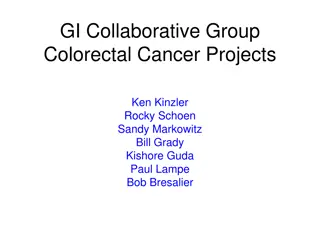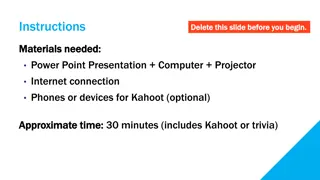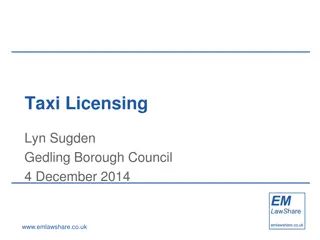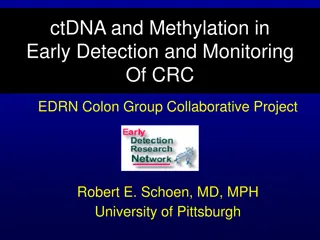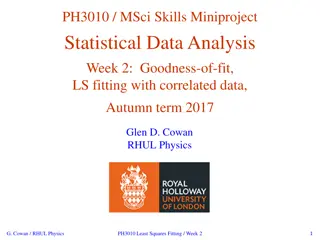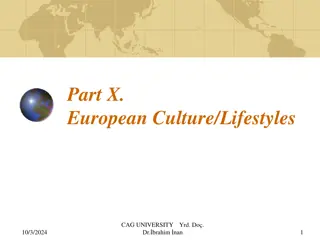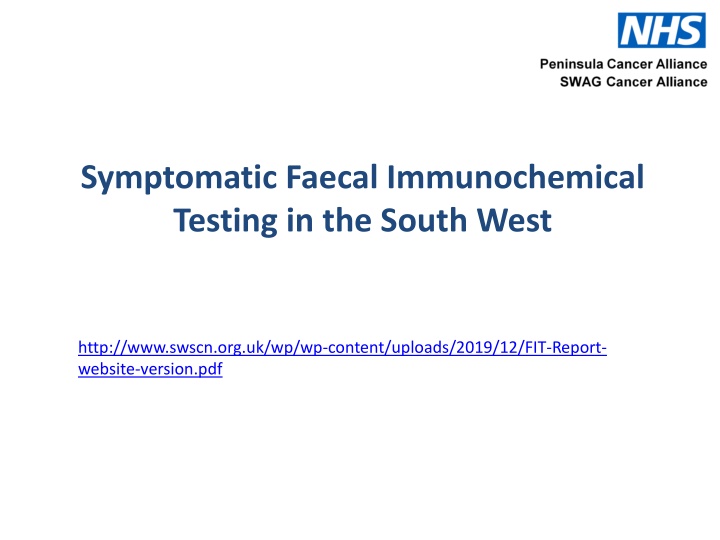
Symptomatic Faecal Immunochemical Testing in the South West
"Learn about the South West Cancer Alliances FIT project aimed at offering FIT to patients with low risk of colorectal cancer, along with audit findings, cancer conversion rate, and implications for practice from early evaluation. Discover how FIT is used as a triage tool by GPs to potentially reduce referrals to secondary care and save costs in the South West region."
Download Presentation

Please find below an Image/Link to download the presentation.
The content on the website is provided AS IS for your information and personal use only. It may not be sold, licensed, or shared on other websites without obtaining consent from the author. If you encounter any issues during the download, it is possible that the publisher has removed the file from their server.
You are allowed to download the files provided on this website for personal or commercial use, subject to the condition that they are used lawfully. All files are the property of their respective owners.
The content on the website is provided AS IS for your information and personal use only. It may not be sold, licensed, or shared on other websites without obtaining consent from the author.
E N D
Presentation Transcript
Symptomatic Faecal Immunochemical Testing in the South West http://www.swscn.org.uk/wp/wp-content/uploads/2019/12/FIT-Report- website-version.pdf
The South West Cancer Alliances FIT project Aimed at achieving compliance with the NG12 NICE Guidance in offering FIT to patients with low risk but not no risk of colorectal cancer. This distinguishes it from other projects where FIT has been used for patients in secondary care who have been referred on a 2WW pathway. The patients included are: Aged 50 or over with unexplained abdo pain or weight loss Aged under 60 with changes in their bowel habit or IDA Aged 60 or over and have anaemia without iron deficiency.
Of the patients seen in secondary care, data collected from trusts shows investigations that at first appointment: 30% Colonoscopy 4% CT colon 0.6% flexible sigmoidoscopy, 4% imaging of some kind, not further specified; 35% Outpatient appointment; these may have had imaging later. 24% No appointment info (& possibly pending appointment) 2% No referral / declined investigation /went private.
Cancer Conversion Rate for FIT +ve Following analysis of the data, the DISCOVERY team at The University of Exeter reported that the percentage of FIT positive patients subsequently diagnosed with cancer is :- 8.0% (95% confidence intervals 6.5 9.8).
Implications for practice from Early Evaluation NICE recommend urgent investigation for suspected cancer when the risk exceeds 3%. A positive FIT represents a risk of 8%, which far exceeds that threshold. The audit shows that GPs are using FIT as a triage to rule out colorectal cancer and thus avoid that patient from being referred onto a 2WW Lower GI pathway; and also as a tool to aid their decision making relating to which is the most appropriate 2WW pathway for that patient. The audit suggests that the number of referrals to secondary care for this cohort of patients has reduced extrapolated this could have a potential cost saving of 1.25million across SW. FIT positive patients represent a very small subgroup of overall colorectal referrals any decreases must be considered against a backdrop of year on year growth. There has been an increase in both the number of 2WW and routine referrals recorded during the time that FIT has been in use. Cost to deliver FIT Service for SWAG annually approximately 66k
Implications for practice from Early Evaluation More FIT-detected colorectal cancers were diagnosed at an early stage -57% (the national target is to achieve 75% by 2028) compared to before the introduction of FIT (44-48% early stage). This has important implications for treatment (more effective at an early stage, with longer survival) and for costs (early stage cancers are less expensive to treat SW saving 150k pa).
Key Features of FIT testing over the project time line Work load across the SWAG area continues to increase in part driven by increased uptake in Somerset Positive rate continues to be between 13-18% Aged over 50 with: unexplained abdominal pain or weight loss continues to be the most common indication for undertaking the test There is persistent low number of rejected samples from patients who have not followed the sample collection procedure or are <50 years, a number of requests are also received without forms which makes patient identification difficult
Future challenges Need to complete the electronic reporting Complete the commissioning process to ensure continued continuity of service across SWAG and ensure acceptable reporting of FIT use occurs Need to ensure there is follow-up of practices who are infrequent users of the service if support from CRUK facilitators is reduced Mechanism to review the lower age limit for the service, there are a significant number of requests from GPs in patients less than 50 which currently get rejected. Although it would be possible to change this on an individual CCG basis a SWAG approach would be easier to implement. Need to review input of samples from the vague symptoms pathway in patients <50 years to ensure they do not get rejected Develop the FIT clinical advisory group to provide appropriate advice to commissioners on the use of FIT testing
Summary from SWAG and Peninsula Cancer Alliances Faecal Immunochemical Testing is a technology that is acceptable to patients and well received by GPs. It is recommended in two sets of NICE guidance: NG12 which offers recommendations for the detection and referral of cancer, and DG30 which specifically relates to the assessment of the FIT technology. This test offers a clear pathway for the investigation of patients who are at risk of colorectal cancer but who do not cross the 3% threshold for urgent referral. It allows sub-stratification of this cohort into people who do need more urgent investigation via a two-week-wait pathway, and those who do not. This is a cost-effective and potentially cost-saving intervention which will help achieve the Long Term Plan NHS aim of diagnosing a higher proportion of colorectal cancers at an early stage It is therefore the recommendation of the South West Alliance s FIT Steering Group that based on the evaluation and findings to date the South West CCG partners commission FIT for their populations as part of routine care, as described

